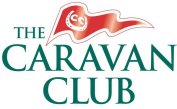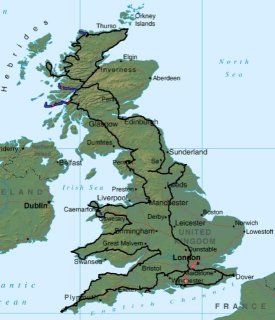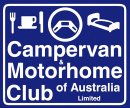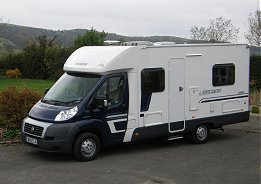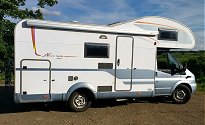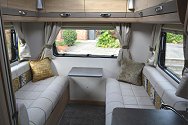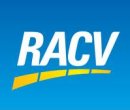ukcampertours.com and .co.uk are available for sale.
Contact: info@ukcampertours.com
 Planning a UK Camper Tour
Planning a UK Camper Tour
UKCamperTours aims to help travellers from Australia and Zealand
to plan a tour exploring the UK in a campervan or motorhome.
Contact: info@ukcampertours.com

Arrival Airport
The UK's largest airports are London Heathrow (LHR) west of London, London Gatwick (LGW) south of London, and Manchester International (MAN) more or less centrally in the UK. (see map below)
Heathrow is one of the world's busiest airports and its runways are operating at 98% capacity so delays are frequent. Many passengers are opting for the quieter, and more central Manchester airport. From there, you can be in the hills of Wales or Derbyshire's Peak District National Park within a few minutes.
Australian and New Zealander visitors are particularly well served by good value direct flights with Etihad, Emirates in partnership with Qantas, and Qatar airways. Qatar are developing a good reputation for legroom and quality of service.
Armed with your flight details SeatGuru's website will tell you about the legroom and seat width on that flight.
Internal Travel
Trains: We book our train fares in advance using the
TheTrainLine.com.
The prices vary depending when you book, but you seem to get the best prices about 3 months in advance.
By travelling outside of rush hour, it is possible to get from London Euston to Manchester in under 2 hours for £36. The TrainLine has a guide to finding cheap rail tickets
here including an
email alert service to tell you when cheap tickets become available
Buses: we use
Traveline . Bus travel is slower but cheaper.
You can get from London Victoria to Manchester in 5-6 hours for about £20.
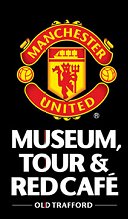
What to See
Manchester makes a perfect starting point to explore the National Parks of Wales Snowdonia, the Peak District, the Yorkshire Dales, the Yorkshire Moors and the Lake District. For music nostalgia, you are also near to Liverpool, home of the Beatles.

If you are interested in castles, stately homes or museums, you might like to visit the National Trust site .
For a £35 subscription you can get free admission to all their sites throughout the UK for a whole year.
Some of the the National Trust sites have camping facilities.
 The nearby M6 Motorway is the main route
North to explore
Scotland calling at
Edinburgh on the way.
The nearby M6 Motorway is the main route
North to explore
Scotland calling at
Edinburgh on the way.
There is a guide to exploring the north coast of Scotland at
NorthCoast500.com
If you want to visit Ireland, the ferry from Holyhead takes you directly to Dublin.
If you want to visit
London, it is best to stay on the outskirts and use public transport to go in to the centre.
Apart from the traffic and parking challenges in town, London has further measures in place to make driving less attractive: a
Congestion Charging system and a
Low Emissions Zone which excludes older vehicles.
Click on our interactive map to find more information about places to visit.
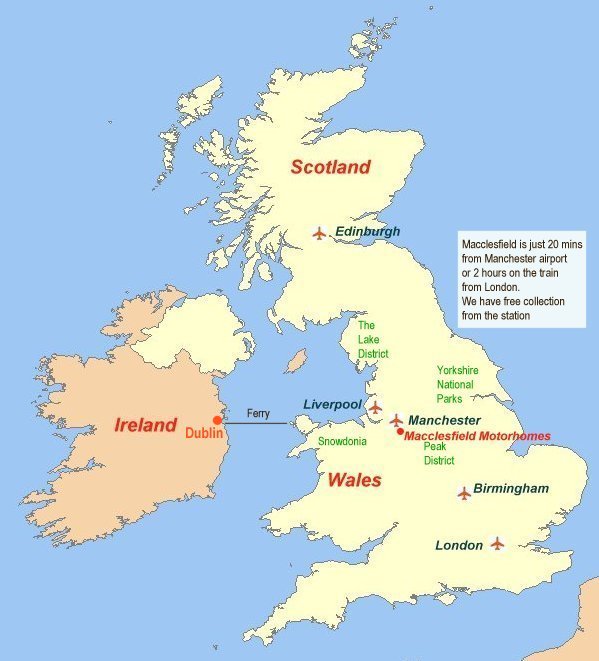
Where to Stay
The main organisations that operate camping sites in the UK are shown below.
They both offer interactive maps so that you can find their sites.
By joining the Caravan Club for £42, you can save £10 per night on many sites, and gain access to some sites that are exclusive to members.
Free Camping or Wild Camping away from official sites. Many people enjoy the freedom of spending a night at remote beauty spots, particularly in Scotland. But it is important not to be an obstruction, and to leave no trace of your visit.
Many pubs and some supermarkets allow their customers to stay overnight in their car parks if asked.
There are websites such as
www.motorhomestopover.co.uk who publish list of pubs where you can stop for free.
Off site camping is a bit of a legal grey area in much of the UK, so be prepared to move on if challenged.
There is a good discussion of the pros and cons at
campervanlife.com
Learn from Earlier Tours
There are several forums and blogs where you can benefit from others experience.
See Graynomad's blog for an account of this grand tour of the UK:-
London to Edinburgh and Edinburgh to Durness
Down the west coast of Scotland Part 1 and Part 2
From Jacobite train to Three Islands cruise
The Lake District and Mountain Goat Tours
Heading for Wales / North Wales / Mid Wales
Cathedrals, another castle and The Cotswolds
Devon and Cornwall and Cornwall and back to Devon
Heading East and Brighton and arrival in London
When to Visit
The UK has a very changeable but temperate climate with average winter monthly temperatures between 1 and 7deg C, and average summer temperatures between 11 and 21 deg C. Each season has its own character, and its own devotees.
The daylight hours vary widely with the seasons:- 4am to 10pm in June, but only 7.30 to 4.15 in mid winter.
May and June are popular for spring flowers, long day length, and avoiding the main holiday period. The Glastonbury music festival at the end of June lasts only a long weekend, but creates a huge demand for camper rental which can make availability very difficult to find for visitors planning a long tour.
For the Scottish Highlands, before or after July and August are the best times to avoid midges.
The autumn colours are at their best in late October and early November, but the days are shortening fast by then.
Seaside resorts and big attractions are busiest during the summer school holidays running from mid July til the first week in September.
Book well in advance
Because you will probably be touring for 3 weeks or more, availability can be spoiled if the hirer accepts just one short booking for any dates within your planned visit, so you will have more choice if you book as early as you can.
What Size of Camper?
Users would like campervans to be like Dr Who's Tardis: bigger on the inside than the outside. If you are making a long trip you need some space to relax in the evenings and when the weather is bad. But equally, the roads in rural parts of the UK and older towns can be narrower and more twisting than you are used to.
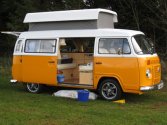 |
VW campervans are easy to drive and park, but headroom is limited, and moving about inside the vehicle requires flexibility more commonly found in the younger generation. Some models a have a toilet, but showers are seldom included. VW's are the romantic icon of camper tours and the older split screen designs more so. But remember that standards of vehicle safety and performance have improved immeasurably since those days. If you hire one of these old vans today, be prepared to cherish it, and take it steady. |
   |
The vast majority of larger campers and motorhomes use a base vehicle, variously badged as Fiat, Peugeot, or Citroen, but all made in the Sevel joint venture factory in Italy. Those built from 2006 are particularly refined, easy to drive with lively engines and very light steering and brakes - as good as a car. |
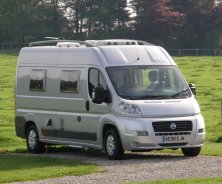 |
Hi-top van conversions are the next size up from the VWs, usually including a shower and toilet, and full height standing room. There is usually a slide out double bed. Some give the option of two single beds or a double. The two singles allow greater freedom of movement around the van in the night, but the double is cosier. There are some versions with a fixed bed, but that is usually at the expense of space in the living area. Read a short illustrated user guide for the Trigano Tribute, one of the most popular vans in this class, here |
Low Profile Over-cab Bed Design
'U' - Shaped Lounge
|
To get more internal space than can be found inside the standard commercial van bodies, the makers offer "coach-built" vans - essentially a pick-up chassis carrying a caravan body. They come in two types "Low Profile" and the classic "over-cab bed" designs. The low profile designs are much less daunting for a novice to drive, though in truth all coach builts are only about 20cm (8") wider than the panel vans. Read a short User Guide A permanently fixed bed in the rear is often an advantage; saving bed making each day,and allowing one person to rest while another has full use of the living facilities. Overcab bed designs have the same fixed bed advantage, but seem like a much bigger vehicle to drive. The extra height that can be a hazard when negotiating overhanging branches or arched bridges.
U Shaped lounges create a pleasant relaxing space, usually convertible into two single beds or one double, but the sideways seating cannot be equipped with seat belts. This often means that a vehicle can sleep more people than it can safely transport. |
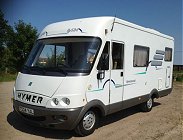 |
The top of the range models, called A-Class, dispense with the classic van cab and extend the coach built body right to the front. Typically this allows a fully made up double bed to be stowed above the driving position during the day, and lowered for instant use at night. |
Weight Limit : Vehicles with a maximum weight greater than 3500kg may only be driven by people with a C1 category licence. Drivers who passed a UK Category B (Car) test before 1 January 1997 will have received Categories C1 and C1+E automatically. Thereafter a separate test was required for a C1 licence. So most people avoid the bigger and older vans for this reason.
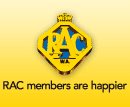
Administrative Arrangements
Drivers Licence: You don't need and International driving licence. Your home country driving licence is fine, but you may get a cheaper deal if you have a UK drivers licence because insurance costs may be lower with some hirers.
Age Limits: Insurers generally require drivers to be between the ages of 25 and 75 years of age.
Insurance: Vehicles are comprehensively insured. It is a good idea to have more than one driver on the policy, if only as a back up in case of illness. Unlike Australia, in the UK vehicle insurance rarely covers "any driver".
Security Deposits: The owner will ask the customer for a security deposit of between £300 and £1250 (depending on the insurer used) when you collect the vehicle. This may sometimes be handled by cheque with a guarantee card, or by pre-authorisation of a credit or debit card. If you pay it with cash, be sure to obtain a written receipt.
It is possible for customers to insure themselves against loss of this deposit using companies such as Worldwideinsure.com . Alternatively some travel insurance polices cover vehicle rental excesses. For example in Australians often use RACV, or QBE .
New Zealanders also have QBE, and in the UK annual policies for hire car excess can be found on the internet.
Breakdown Cover: The vehicle generally have roadside recovery for breakdowns.
Rules of Road: Fortunately, the UK and Ireland have not adopted the european preference for driving on the right, but the rules of the road are subtly different. You can check them on the Highway Code website
Luggage Storage: When you have stowed your gear in the camper, there may not be much room for your empty cases. Hirers may be able to store them for you.
Stay connected: Some hirers offer a USB 3G modem for your laptop such as those offered by the "3" network. Alternatively, you may be able to make use of wi-fi on some campsites, cafes and restaurants.
Some mobile phone operators allow "tethering" to a laptop allowing use as a modem.
Faster 4G mobile internet connections are just becoming available in the UK on the
Everything Everywhere network
For a good consumer guide to the UK mobile phone market try Money Saving Expert.

